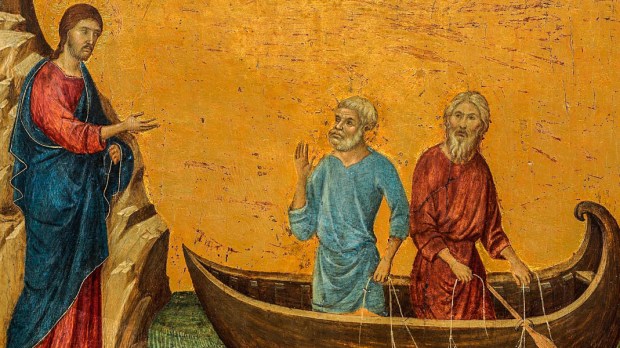Jesus said to his disciples:“I have come to set the earth on fire,and how I wish it were already blazing! There is a baptism with which I must be baptized,and how great is my anguish until it is accomplished!” —Luke 12:49-50
What are you passionate about? What stirs up fire within you?
For some of us, it’s the demands of justice—feeding the hungry, clothing the naked, providing drink for those who thirst, freeing those wrongly imprisoned, and making a home for the stranger. Others among us are passionate about prayer and the spiritual life. And then, of course, we have those relationships that we protect fiercely.
All these are good and worthy … and they are also intimately connected, since we can never compartmentalize our relationships, spirituality, and the work for justice.
In this Sunday’s Gospel, we are given a sense of the passion that burns within the heart of Jesus: the Reign of God. But this impassioned, fiery Jesus might startle us, as he proclaims his desire that the world were aflame with the same fire that consumed him.
As I observed in my reflection on last Sunday’s Readings, the passages from Luke’s Gospel that we are hearing in this span of Ordinary Time are inviting us to reflect on what it means to live our faith, putting into practice what we profess. At the same time, the passage proclaimed on the 20th Sunday of Ordinary Time presents a different, perhaps even startling facet of Jesus’ teachings.
The Prince of Peace asks, “Do you think that I have come to establish peace on earth?” Of course we do, because that’s what we’ve been taught to expect. That is our hope.
When looked at from the perspective of discipleship, we recognize that what Jesus is asking us to reflect on is the prophetic stance that is part of discipleship. However, as we see in the story of Jeremiah proclaimed in the First Reading, that prophetic stance can put us at odds with those who are opposed to the truth. This was certainly true for Jesus as well.
As we think of the story of Jeremiah and the mission of Jesus, we know that there were some who welcomed their preaching and who were caught up in the fire of their mission. Others resisted, however, because both Jeremiah and Jesus were calling for change and the comforts and complacency of the resisters were being burned up by the fire of the prophetic proclamation.
This is what put Jeremiah in prison. This is what put Jesus on the cross. The status quo couldn’t be maintained and the old attitudes and behaviors had to be refined.
And it is here that we discover a sort of two-fold examination of conscience within this Sunday’s Gospel.
First, do you ignore or try to silence those prophets who are calling for change—change within ourselves, our communities, or even in the Church? Are you willing to risk dialogue and even conversion, as we are invited to reflect not only on what is possible, but on what might be essential?
This can become especially difficult for us when we are being asked to reconsider things that are near and dear to us. But discipleship demands that we not become complacent or settle.
Second, are you willing to live out your call to be a prophet yourself? Where are the injustices or abuses that need to be named? What wrongs need to be made right? What wounds need to be healed?
While we are called to pray for peace, we are also called, by virtue of our baptism, to adopt a prophetic stance and call for change—for conversion—where change is needed. This also means that we have to be courageous enough to stand alone, at times.
As we continue our journey through Ordinary Time, reflecting on the demands of our discipleship and what it means to truly live the faith, we recall the words of St. Catherine of Siena: “Be who God meant you to be and you will set the world on fire.”
Words of Wisdom: “The fire that Jesus speaks of is the fire of the Holy Spirit, the presence living and working in us from the day of our Baptism. It — the fire — is a creative force that purifies and renews, that burns all human misery, all selfishness, all sin, which transforms us from within, regenerates us and makes us able to love. Jesus wants the Holy Spirit to blaze like fire in our heart, for it is only from the heart that the fire of divine love can spread and advance the Kingdom of God.
“It does not come from the head, it comes from the heart. This is why Jesus wants fire to enter our heart. If we open ourselves completely to the action of this fire which is the Holy Spirit, He will give us the boldness and the fervor to proclaim to everyone Jesus and his consoling message of mercy and salvation, navigating on the open sea, without fear.”—Pope Francis

